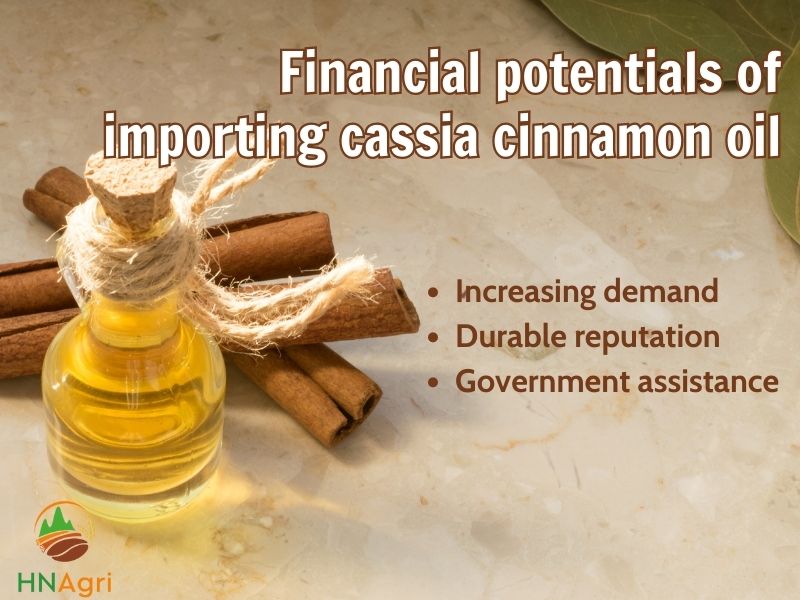Are you searching for a natural product to increase your revenue? Check out our cassia cinnamon oil article! Learn about the advantages of utilizing cinnamon oil in your products and how it may help you stand out in a crowded market. Our post will teach you how to get high-quality, low-cost cinnamon cassia oil to increase your profit margins.
Table of contents
The overall knowledge about cassia cinnamon oil
This first section will clearly explain the meaning and basic characteristics of cinnamon cassia oil.
Detail definition of what is cassia cinnamon oil
Cinnamon oil originates primarily from cinnamon bark. Some cinnamon oil, however, is produced from cinnamon leaves:
| Bark-based cinnamon oil | Leaf-based cinnamon oil | |
| Color | Amber or dark brown in color | Lighter, ranging from yellow to pale greenish brown |
| Texture | Thin, lightweight texture with a smooth, oily feel | Same as bark-based |
| Taste | Cozy, sweet, slightly spicy, and bitter taste | Softer flavor, mildly sweet and herbal undertone |
| Aroma | Powerful, sweet, and woody scent with hints of spiciness and warmth | Milder, more herbaceous scent with hints of spice and sweetness |
| Oil content | 80-95% | 70-80% |
| Moisture | 2-4% | 2-4% |
| Coumarin | Higher | Lower |
Cassia cinnamon oil from bark has a cozy, sweet, slightly spicy taste with a powerful, woody scent. It is golden to dark brown in color, lightweight, and smooth. It has higher oil content (80-95%) and coumarin levels. In contrast, cinnamon oil from leaves has a softer flavor, mildly sweet and herbal, with a milder, herbaceous scent. It has a pale yellow to yellowish tint, similar texture, lower oil content (70-80%), and relatively lower coumarin content.

Cultivation areas and quantity of cassia cinnamon oil
Cinnamon cassia oil is produced in several regions of Indonesia, Vietnam, and China, with varying quantities and quality.
- Indonesia: Indonesia is a major producer of cinnamon oil, with main growing areas in Sumatra, Java, and Sulawesi, particularly the Kerinci region. The quantity ranges from several hundred to a few thousand metric tons.
- Vietnam: Vietnam is a significant producer of cassia cinnamon oil, with primary growing areas in mountainous regions like Quang Nam, Quang Ngai, Thanh Hoa, and Nghe An provinces. The country’s annual cinnamon oil production ranges from a few hundred to over a thousand metric tons.
- China: China produces cinnamon oil in smaller quantities compared to Indonesia and Vietnam. The main growing areas are in Guangxi, Guangdong, and Yunnan provinces. The quantity is estimated to be in the range of a few hundred metric tons.
These 3 countries also play the most important roles in the market of cinnamon oil bulk, which is a must-known for cinnamon importers.

The shelf life of cassia cinnamon oil and how to preserve
On average, properly stored cinnamon oil can have a shelf life of around 2 to 3 years. However, it’s important to note that the oil’s potency and fragrance may gradually diminish over time.
To preserve cassia cinnamon oil and extend its shelf life, it is recommended to follow these guidelines:
- Store in a cool, dark place
- Use airtight containers
- Avoid moisture
- Avoid contact with air
- Handle with clean utensils
Various beneficial uses of cassia oil cinnamon
Cinnamon cassia oil has a wide range of applications in cooking, medicine and essential fragrance. Here are some common uses:
- Cooking: Cassia cinnamon oil is a natural flavoring agent used in Asian cuisines to enhance the taste of dishes, marinades, and sauces. It is also popular in confectionery, adding a distinctive cinnamon flavor to candies, chocolates, and pastries.
- Medicine: It is used in aromatherapy for its warm scent, and in traditional medicine, it aids digestion and has antimicrobial properties. It is employed in respiratory support and can be used in massage blends to promote circulation and provide a warming sensation when properly diluted.
- Essential oil: Cinnamon cassia oil is commonly used in essential oil blends and fragrances, adding a warm and spicy note. Cinnamon essential oil is an important element in perfumes, candles, and personal care products for its aromatic qualities.

Financial potentials of importing cassia cinnamon oil
Importing cinnamon cassia oil has significant profit potential, making it a desirable product for importers. There are several reasons for its profitability, all of which add to its attraction and the likelihood of significant earnings:
- Increasing demand: Cassia cinnamon oil is experiencing a growing demand due to its unique flavor, increasing interest in natural products, and perceived health benefits. The rising popularity of natural flavorings, aromatherapy, and organic ingredients has contributed to its increasing use in various industries.
- Durable reputation: Cassia cinnamon is prized around the world for its great flavor, enticing aroma, and high content of cinnamaldehyde, which may provide health advantages.
- Government assistance: Governments in both importing and exporting countries provide assistance to the cinnamon industry through agreements on trade which supply importers of cassia cinnamon with beneficial tariff rates, which might result in smaller or zero import taxes and allow them to present affordable rates in the markets they serve.

The average expense of cassia cinnamon oil
| Indonesia | $6000 to $10000 per ton |
| Vietnam | $8000 to $15000 per ton |
| China | $5000 to $9000 per ton |
The price of cassia cinnamon oil from Vietnam is the highest, followed by Indonesia and China. It is considered to be superior quality and has a higher cinnamaldehyde content compared to other varieties. The higher quality and desirable characteristics of Vietnamese cinnamon contribute to its higher price.
However, the price of cinnamon cassia oil is influenced by factors such as supply and demand dynamics, harvest conditions, market competition, quality and grading, and economic and geopolitical factors. Changes in these factors can lead to fluctuations in the price.

How to detect reliable cassia cinnamon oil suppliers
With the basic knowledge of cinnamon cassia oil, the next step is to locate a credible source of this product line. Follow the helpful methods listed below.
Significant signs of scam cassia cinnamon oil suppliers
Here are some signs that may indicate potential scam cinnamon cassia oil suppliers:
- Unbelievably low prices
- Lack of information transparency about cinnamon oil factory or you can’t find their factory address.
- Poor product quality
- Inconsistent or false documentation
- Lack of customer reviews or references
- Unprofessional conduct or poor communication
It is important to conduct thorough research, verify credentials, and consider reputable sources when engaging with cassia cinnamon oil suppliers to avoid falling victim to scams or receiving low-quality products.

Some famous cassia cinnamon oil suppliers
If you are interested in starting a cinnamon cassia oil business, this section will show you the top cinnamon oil suppliers in the world who are already well-known in the cinnamon industry.
- Hanoi Cinnamon: With over 21 years of expertise in cinnamon, Hanoi Cinnamon is a renowned Vietnamese supplier of cassia cinnamon oil. Hanoi Cinnamon’s wholesale rates for cinnamon oil fluctuate between $5 to $15 per litter, which is competitive in the present cinnamon market. They export to countries such as the United States, the United Kingdom, Europe, India, Mexico, and Korea.
- Aroma Atsiri in Indonesia: Aroma Atsiri Indonesia (AAI) is an essential oil company established in Indonesia that is rapidly expanding. They have a skilled research staff dedicated to researching novel extraction technologies and delivering cinnamon advice to farmers. AAI’s products are shipped to countries throughout Europe, America, and nearby regions, with cinnamon oil costing around $17 per litter.
- Shaanxi Fuheng Biotechnology Company: Shaanxi Fuheng (FH) Biotechnology Co., Ltd. is a major provider of Chinese cinnamon and cassia cinnamon oil. They sell cinnamon bark extracts in bulk from reputable Chinese cinnamon suppliers. Wholesalers rely on Shaanxi Fuheng (FH) Biotechnology Co., Ltd. for product quality and customer service.






